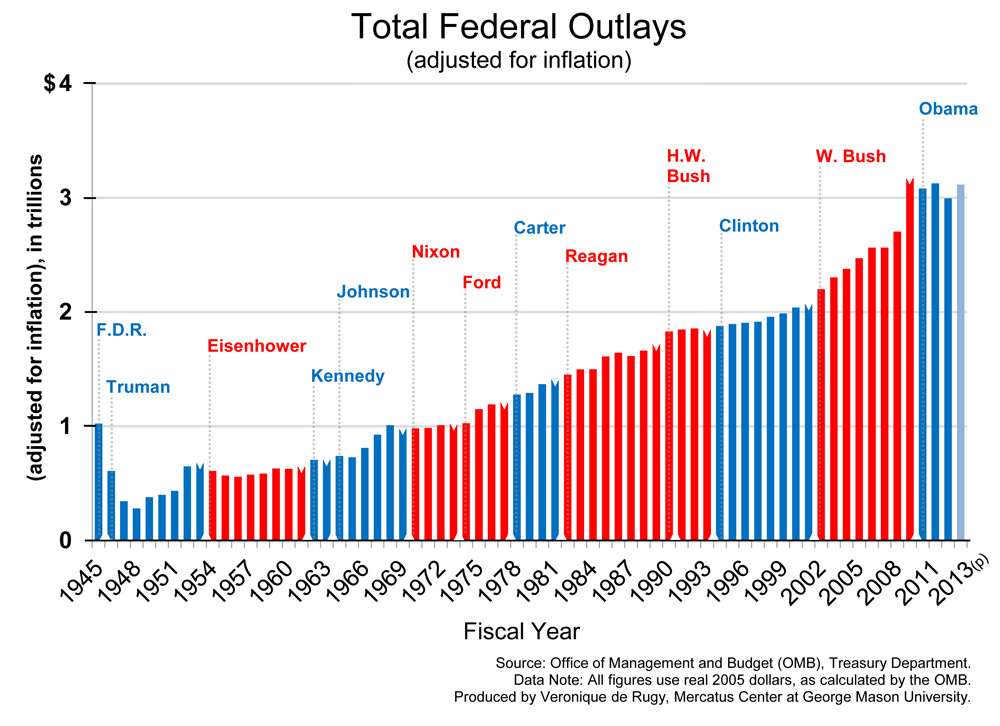The First Senate Budget in Four Years Is Not Worth The Wait
The Senate Democrats have, after four long years, finally released an actual budget document. It's not worth the wait. It proposes spending $3.7 trillion in 2014, a number it grows to $5.7 trillion in 2023. It calls for almost a trillion dollars in new taxes over the same period.
The one interesting thing about it is something that has been completely overlooked in most news accounts: When it comes to next year's spending and taxes, it is virtually indistinguishable from the GOP's rival plan.
Four years! William Faulkner published The Sound and the Fury, As I Lay Dying, Sanctuary, and Light in August in a four-year span. The Beatles released Rubber Soul, Revolver, Sgt. Pepper's, Magical Mystery Tour, the "White album," and Abbey Road (plus other music) over four years. Even after turning 65, Clint Eastwood has managed to direct as many as five movies during any given four-year period.
The Senate Democrats' budget, led in this effort by Sen. Patty Murray (D-Wash.), is called "Foundation for Growth: Restoring the Promise of American Opportunity." They should be ashamed of themselves if this took more than few long nights to pull together. With the tin-eared chutzpah native to majority members in the World's Greatest Deliberative Body, the document proclaims
The Fiscal Year 2014 Senate Budget builds on the work done over the last two years to create jobs, invest in broad-based economic growth, and tackle our deficit and debt responsibly.
Here's a news flash for the Senate Democrats (and the rest of Congress): If you're proposing more of whatever it is you've been up to over the past two years or since 2009, when you last submitted a budget, thanks but no thanks.
Click on the link above to read through the turgid verbiage that surrounds the document, which pretends to bring some semblance of restraint and responsibility despite proposing nearly a trillion dollars in new taxes over the coming decade and increasing annual government outlays from this year's estimated $3.6 trillion to $5.7 trillion in 2023 (for the summary tables that lay out actual spending and revenues, go here).
If these folks can seriously claim that for a document that proposes to increase annual budgets by 58 percent in current dollars over the next decade and keep a straight face, they should be auditioning for a new run of Make Me Laugh. It's sad enough when the GOP proposes to jack spending by over 40 percent in the name of smaller government, but this is simply ridiculous.
Judging by the press coverage of the budget, you would be hard-pressed to have any idea what the Democrats propose for 2014, the one year that would actually be covered by a budget bill. This sort of weird and frustrating oversight is typical of all accounts related to budgets plans. A lot of the coverage of GOP House plan released earlier this week, for instance, mentioned that Paul Ryan's budget would radically alter Medicare in 2024 - a year that is not even covered in the 10-year "budget window" annual budget documents present. It was a lot harder to simply find out what the Republicans propose to spend and raise in 2014 than it was to hear about all the deficit reduction etc. that a single-year budget plan was going to create over the next decade.
The same is true with the Democrat's plan. Check out this representative CNN Money story on "What's in the Democrats' Budget?" and you'll find all sorts of fun calculations of how much the plan cuts deficits as a percentage of GDP, how much it raises in tax revenues through 2023, and more. What you won't find is a simple declaration of what the Senate Democrats say they want to spend next year and how much they want to raise in tax revenues.

For the record, those figures are $3.7 trillion and $3 trillion respectively.
Arguably the most interesting thing - perhaps the only interesting thing - about those numbers is how close they are to the 2014 numbers in the GOP budget, which proposes spending $3.5 trillion next year while raising $3 trillion in revenue (see Table S-1 here). That's the real news in this budget season: The Senate Dems and the House GOP are just $200 billion apart on the spending side for the coming fiscal year. Both sides - and the president of course, who has already sworn to stand against any spending or "grand bargain" that might "gut Medicare or gut Social Security or gut Medicaid" - could very quickly come to an agreement on next year's budget, upon which there seems to be almost complete agreement.
After that, they could actually start seriously and openly debating matters such as reforming the tax code (all sides agree it needs a fundamental rethink), what to do about entitlements (all sides agree that Medicare especially threatens fiscal stability), and how to seriously address growing debt and deficit issues (again, all sides agree that deficits need to shrink and debt to GDP needs to be reduced). Who knows? We could even have the sort of engaged debate - one that involves the actual citizens and taxpayers of this fine country - about the size, scope, and spending of the federal government that Washington and the press seem so terribly opposed to.


Show Comments (79)